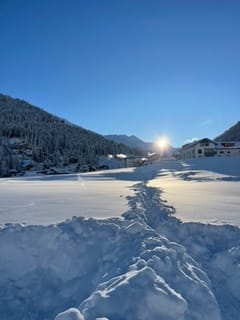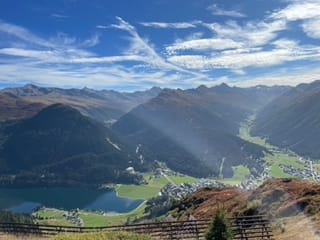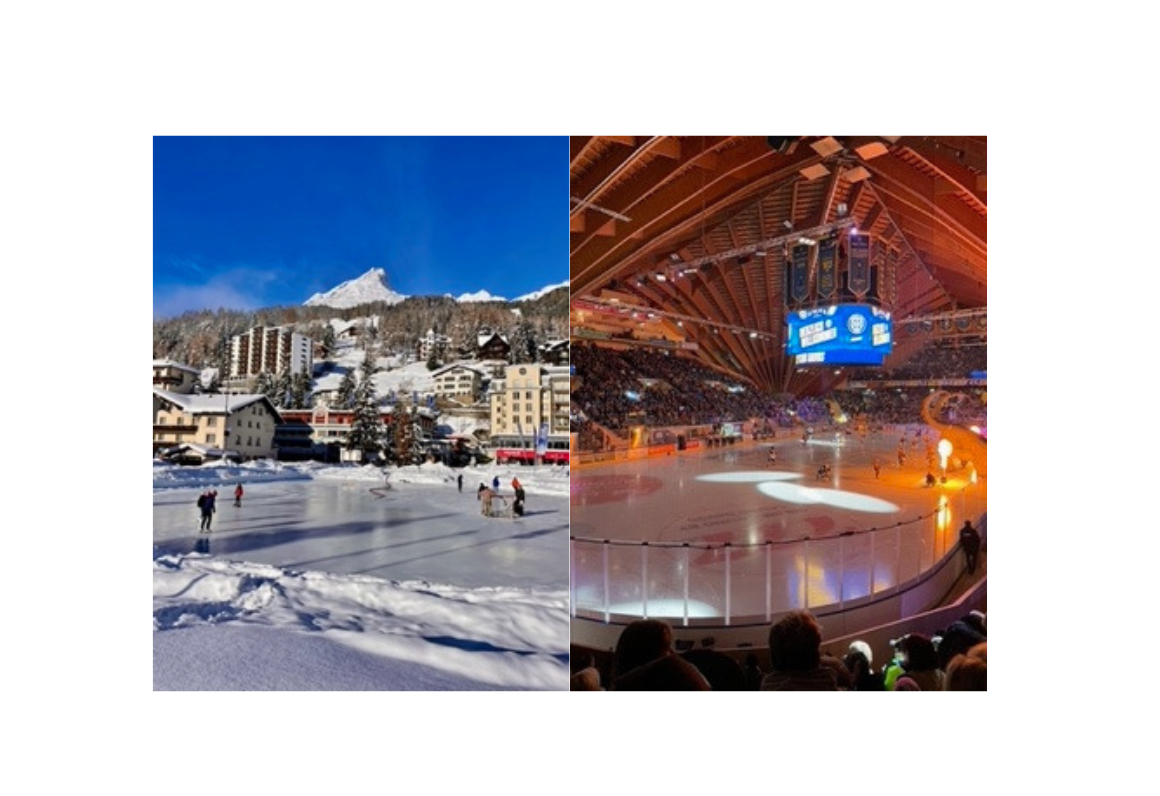Life of an Import 10 📍
A special edition of Life of an Import, featuring a guest interview!

This week we have our second Import Insider featuring Leah Marino! Leah is no stranger to traveling for hockey, growing up playing in Lake Tahoe, California. She currently plays for Davos in the PostFinance Women’s League in Switzerland. Read about her hockey journey and her experience in Europe!
This interview was conducted via text and the post has been approved by Leah Marino.
Import Insider: Leah Marino
Q: How did you get into hockey and what was hockey life like in Lake Tahoe - or did you have to travel to play?
LM: I started playing hockey around the age of 5 after my older brother began playing. Our local rink was only about 15 minutes away from my house, so I was lucky in that respect. However, Lake Tahoe is fairly isolated in the mountains, so we often had to travel pretty far for youth games. I was the only girl to play for our organization growing up. It wasn’t until I was older that another girl (Katie Sonntag) moved to Tahoe, and we got the opportunity to play together with the boys for a few seasons. The closest girls’ team to us was in San Jose, so our freshman year of high school, our parents would drive us 4 hours each way every weekend to play and practice with the girls. It was after this season that we realized we really wanted to pursue hockey at the highest level, and we both moved away for the rest of our high school careers.
We’ve stayed in touch as best friends throughout the years and decided to pursue this journey in Davos together! It brings back the memories of playing together when we were kids.
Q: Was pursuing something like NAHA/NCAA hockey a goal from a young age for you?
LM: From a fairly early age I knew that I wanted to take hockey as far as possible. My ultimate dream growing up was to play in the Olympics, and I think that was able to push me to play at the elite levels that I did. I remember hearing about NAHA when I was just 12 years old. They have always been known as a top program, and their ability to place players at NCAA schools is unparalleled. I knew that they were my best option to help me play Division 1. I was often told growing up “If you’re good enough, they’ll find you”. However, I feel that in women’s hockey especially, that is not the case. You have to go where the scouts are. You have to put yourself in front of them. This was something that my family and I had to come to terms with as I got older, and NAHA made that process a lot easier.

Q: How did you end up with the Toronto Six after playing for Robert Morris University?
LM: My story of entry into pro hockey is a little different than most. After my junior season at Robert Morris University, the school cut both the men’s and women’s hockey programs. I immediately entered the transfer portal in an attempt to find a team to finish my senior season with. However, I was in a unique program while I was at RMU where I was earning both my master’s and bachelor’s degrees at the same time, so my credits were very difficult to transfer with. I was extremely stressed and concerned that I would have to choose between finishing school and continuing to play hockey. That’s when the GM of the Toronto Six ended up reaching out to me to see if I would consider playing pro and finishing my schooling online. This proved to be the perfect situation, and the Six drafted me about a month later. This made me the youngest person to ever be drafted and play in the PHF.
Q: What was your path to eventually join the SWHL?
LM: It was always a goal of mine to play overseas after finishing college. I knew that it was an experience that I wanted to have, and something that not many people get the opportunity to do. However, after the RMU hockey program was cut, the PHF became a greater option for me. I still wanted to get overseas before I got too deep into a career and have always liked the idea of playing in Switzerland because of how beautiful it is. Its location within Europe is centralized making it easy to travel. Not to mention, the league has had tremendous growth in recent years. While I was playing with the Riveters last season, I was fortunate enough to live with two of our imports, one from Hungary and one from Switzerland. They gave me a lot of great information on how the leagues work over here, and the one from Switzerland provided some contacts from the SWHL. I started to reach out to teams and was fortunate enough to land a spot in Davos which was my top choice.
Q: Tell me about the town you live in and what it’s like living in Switzerland!
LM: Davos is a fairly small town, but I actually really enjoy the size. It’s not as overwhelming as a big city would be and still has plenty to do. Most of the activities are outdoors and the town puts a lot of effort into making sure that things are accessible and easy so that you can explore as much as possible. It’s absolutely beautiful here and reminds me of the mountain lifestyle I grew up with in Lake Tahoe. Hockey is also a big deal here, so the pride the community takes in HCD is really special.
Q: How about the facilities and the rink you play out of?
LM: We play and practice out of Valliant Arena, the same rink as the men’s team. The club has been amazing at making sure we have the same resources as the men, so we have our own locker room, gym times, and physios. We also have access to what we call the goalie and player galleries, which are extra training areas to work on various skills like shooting, mobility, balance, speed, etc… We are able to access all of these areas with our own key cards 24/7.

Q: Can you describe an average week for your team?
LM: We have four team practices and four workouts a week, usually followed by one or two games on the weekend. As an import, I also skate a fifth time with the boys’ team to work on extra skills. So, a typical week looks like:
Monday – Skate (mainly skill work) & Workout (lift)
Tuesday – OFF (this is when I skate with the boys)
Wednesday – Skate (high intensity) & Workout (lift)
Thursday – Skate (high intensity/ line work) & Workout (stability, power, coordination)
Friday – Skate (systems) & Workout (speed)
Q: I’m curious about travelling with all the teams being in the same country, so probably not that many overnight road trips?
LM: With Switzerland being a smaller country, it’s different travelling to games. I’m used to almost always staying overnight in the U.S., whereas here, we usually drive to the game and back in one day. We also rarely play a team back-to-back, so we are playing two different clubs most weekends.
Q: What was the most difficult part about deciding to/making the move to play overseas?
LM: I think the most difficult thing about making the move to play overseas was just recognizing how far away I’d be from my family and friends. Just coming to the realization that my support and comfort was not going to be as accessible as I’ve grown accustomed to.
Q: What’s been your favorite part about playing overseas?
LM: There has been a lot of things that I’ve loved so far, but experiencing a new lifestyle has been really cool. There are so many differences from the United States, and I’m learning things every day. Even the way hockey is played is a bit different since the ice is bigger.
Q: Any insight you want to give about being an import on your team?
LM: I think the hardest thing about being an import is the communication factor. I’m really lucky that the majority of the team and staff speak good English, but it is difficult to establish some of those close relationship as quickly as I did in the U.S. There are also a lot of cultural differences, so I tend to spend time following the actions of my teammates to make sure that I don’t disregard their customs. My days definitely consist of more conscious thinking in relation to actions and communication. The girls have been amazing at helping us feel comfortable here and grow accustomed to their country.
Q: Between Toronto, NY & Switzerland what’s been your favorite place to live so far?
LM: I would have to say Switzerland is undoubtedly my favorite place I’ve gotten to live so far. I had never been to Europe before this, so everything is so new and exciting for me. However, both Toronto and New York were amazing cities that certainly made it easier for me to take this step.
Q: Anything else you want to say to The Ice Garden readers?
LM: Just to keep supporting women’s hockey because the game is growing at an exceptional rate across the world. All of the support and coverage only helps the players and the game flourish more!!

Thank you for reading this edition of Import Insider! From growing up in a non-hockey hot bed, having your collegiate program cut to being the youngest person drafted into the NWHL and eventually winding up in Switzerland, following hockey can create quite a unique adventure. It’s exciting to hear that women’s hockey around the world is receiving more and more investments and opportunities post-collegiate for players and thank you to Leah for taking the time and sharing her experience!
You can follow along with her adventures on her Instagram or check out the HC Davos team page.





Comments ()